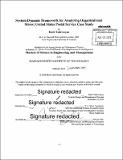| dc.contributor.advisor | V.A. Shiva Ayyadurai. | en_US |
| dc.contributor.author | Tadevosyan, Davit | en_US |
| dc.contributor.other | System Design and Management Program. | en_US |
| dc.coverage.spatial | n-us--- | en_US |
| dc.date.accessioned | 2015-12-16T16:34:32Z | |
| dc.date.available | 2015-12-16T16:34:32Z | |
| dc.date.copyright | 2014 | en_US |
| dc.date.issued | 2014 | en_US |
| dc.identifier.uri | http://hdl.handle.net/1721.1/100365 | |
| dc.description | Thesis: S.M. in Engineering and Management, Massachusetts Institute of Technology, Engineering Systems Division, System Design and Management Program, 2014. | en_US |
| dc.description | Cataloged from PDF version of thesis. | en_US |
| dc.description | Includes bibliographical references (pages 102-106). | en_US |
| dc.description.abstract | Stress, both individual and organizational, appears to be an increasing problem in any society, and more so in organizations. It already is taking a significant toll on corporate and national levels. Slow recovering economy and pressures on bottom lines, especially for financially constrained organizations, further emphasize the problem and call for new solutions. This paper explores two aspects of stress - individual and organizational. Our goal was to provide a systems dynamic framework that organizations, as well as individuals, can use to improve the understanding of the physiological and psychological stress loads, as well as understand their relationship to organizational key performance indicators. Like many natural systems, human body is the ultimate limited system. The main benefit of the proposed framework will be the ability to monitor cumulative variables of the functional capacity of human body to process stressors, and the mental and emotional capacity of employees to carry out their duties. | en_US |
| dc.description.statementofresponsibility | by Davit Tadevosyan. | en_US |
| dc.format.extent | 106 pages | en_US |
| dc.language.iso | eng | en_US |
| dc.publisher | Massachusetts Institute of Technology | en_US |
| dc.rights | M.I.T. theses are protected by copyright. They may be viewed from this source for any purpose, but reproduction or distribution in any format is prohibited without written permission. See provided URL for inquiries about permission. | en_US |
| dc.rights.uri | http://dspace.mit.edu/handle/1721.1/7582 | en_US |
| dc.subject | Engineering Systems Division. | en_US |
| dc.subject | System Design and Management Program. | en_US |
| dc.title | System dynamic framework for analyzing organizational stress : United States Postal Service case study | en_US |
| dc.title.alternative | United States Postal Service case study | en_US |
| dc.type | Thesis | en_US |
| dc.description.degree | S.M. in Engineering and Management | en_US |
| dc.contributor.department | System Design and Management Program. | en_US |
| dc.contributor.department | Massachusetts Institute of Technology. Engineering Systems Division | |
| dc.identifier.oclc | 931567769 | en_US |
